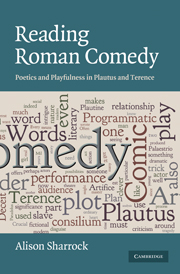Preface
Published online by Cambridge University Press: 18 December 2009
Summary
I hated Roman comedy as an undergraduate. Not only was it hard Latin, but also it gave little promise to be worth the effort, as being apparently a stereotype-ridden exercise in lamentable literary secondariness. It was only many years later when I was forced to teach the genre that I began to see that there might be some fun in it. Perhaps I should apologise for being slow, but anecdotal research suggests that I am not alone in my early experience, and that, apart from a select group of experts, most people, even professional classicists, are not avid readers. The less-than-avid readers of Plautus and Terence are first among those for whom this book is written. If the experts also find something here to amuse, if not to inform, I shall be well pleased.
From a career beginning in Augustan elegy, my entry into Roman comedy does not follow what might be thought the traditional route from the former to the latter. That there has been some degree of connection between the two genres has been known since antiquity, although not greatly exploited by modern critics, but the connections made have in any case been largely through what one might call the fictional worlds of the two genres. Insofar as one believes the imagined world of elegy to be that of a ‘demi-monde’, where the main players are slaves and freedwoman-prostitutes interacting with citizen men, that world can be seen to relate to the fictional world of the fabula palliata.
- Type
- Chapter
- Information
- Reading Roman ComedyPoetics and Playfulness in Plautus and Terence, pp. ix - xiiPublisher: Cambridge University PressPrint publication year: 2009

